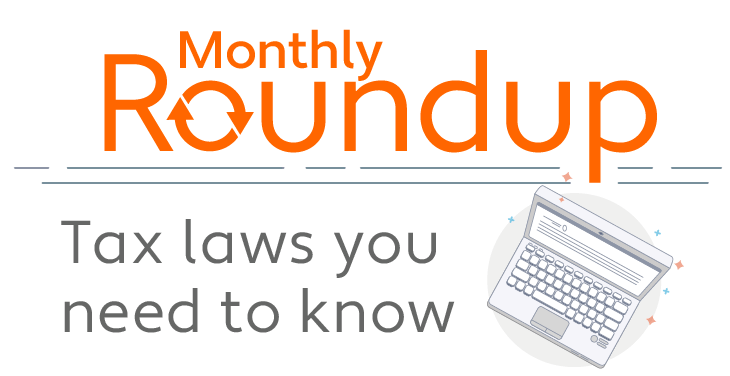Amazon tax spreads in 2017
There’s something on the way from Amazon.com for residents of Iowa, Louisiana, and Utah. It isn’t gift-wrapped; it won’t arrive by December 25; and it’s probably not on very many Wish Lists, but it’s bound to make at least a few people happy: those responsible for balancing the state’s budgets. Beginning January 1, 2017, Amazon will start charging sales tax in Iowa, Louisiana, and Utah.
Utah
The Utah news broke first, on December 7. Governor Gary Herbert told reporters that his administration had been “working to get a voluntary agreement with Amazon, and it looks like we’ve done that now.” It’s a voluntary tax collection rather than an obligatory one because Amazon lacks a substantial nexus with the state. Under Utah law, a business cannot be required to collect sales or use tax on Utah transactions unless it has a substantial physical presence there.
Although there have been repeated attempts to enact remote sales tax legislation in Utah, proponents thus far have been unable to overcome the opposition. The new agreement with Amazon may help build momentum for a tax on remote sales. Gov. Herbert is certainly on board; he recommends aggressively pursuing “collection of the estimated $200 million in taxes currently due on remote sales.” Amazon may take the lion’s share of sales, but it isn’t the only out-of-state seller selling to Utah residents.
Iowa
Iowa’s announcement came on the heels of the Utah news. An Amazon spokesperson reportedly told KCCI that “Amazon will be required to collect sales tax in Iowa beginning on January 1, 2017.” However, exactly what lay behind the decision is still unknown. It could be a voluntary tax collection, as in Utah, and it could be due to an agreement that’s not yet been revealed. Iowa Governor Terry Branstad (R) has been a vocal proponent of tax fairness for years, urging congressional legislators to support a federal online sales tax.
Louisiana
Amazon announced yesterday that it would start collecting Louisiana sales tax on January 1, 2017, and the Louisiana Department of Revenue has confirmed the news. That means Louisiana residents could once again be eligible to participate in Amazon’s Associates Program; they were shut out in April 2016, after Louisiana enacted internet sales tax in the form of click-through and affiliate nexus. This, too, appears to be voluntary collection.
Businesses can benefit by agreeing to collect tax when not required. In Alabama, where Amazon now participates in the Simplified Seller Use Tax Remittance Act, the ecommerce giant will report and a remit a flat 8% tax rather than a hodgepodge of varying combined local rates. Under the Utah deal, Amazon may keep a percentage of the taxes it collects.
32 states plus D.C.
The list of areas where Amazon transactions are taxed is growing. Once the ball drops, it will collect sales tax in 32 states, plus the District of Columbia (and in limited circumstances, Delaware and Alaska). Indeed, a majority of Americans have paid tax on Amazon sales since late 2013.
However, many other businesses don’t collect remote sales tax, and many states are frustrated by the physical presence precedent that impedes them from imposing a tax obligation on out-of-state companies that advertise and sell to their residents.
Federal solution v. SCOTUS
Congress could enact legislation that would remove the physical presence requirement. Three bills already exist: the Online Sales Simplification Act, Remote Transactions Parity Act, and the Marketplace Fairness Act. A fourth seeks to prevent states from taxing any seller without a physical presence in that state: the No Regulation without Representation Act.
Proponents of online sales tax hoped to see a favorable bill passed in 2016. Now they’re looking ahead to 2017. With a Republican-controlled House, Senate, and White House, federal tax reform is likely. It remains to be seen whether or not online sales tax legislation will be considered.
Alternatively, a solution could come from the courts. The Supreme Court of the United States (SCOTUS) recently allowed Colorado’s use tax reporting requirement to stand, but it refused to use it to reconsider Quill Corp. v. North Dakota (the pivotal 1992 case that upheld the physical presence requirement). In addition, the Ohio Supreme Court determined in November that a business can have substantial nexus without a physical presence, although the case pertained to Ohio’s commercial activity tax, not sales tax.
Several other cases seeking to challenge Quill are making their way through the court system, and one regarding South Dakota’s economic nexus policy may be “fast-tracked for U.S. Supreme Court review.” Yet although Justice Kennedy stated in March 2015 that “it is unwise to delay any longer a reconsideration of the Court’s holding in Quill,” SCOTUS has to date turned down cases that could lead to that. Perhaps the right case just hasn’t yet presented itself.
It seems that, unless or until Congress or SCOTUS acts, states will continue to take on the issue. Virginia could be the next to do so: Governor Terry McAuliffe is calling “for online businesses with warehouses or fulfillment centers in Virginia to pay state sales tax” (WSJ).
Tax automation software helps businesses comply with sales and use tax laws in all states.

Your competitors live by this annual report
Trusted by professionals, this valuable resource simplifies complex topics with clarity and insight.
Stay up to date
Sign up for our free newsletter and stay up to date with the latest tax news.













